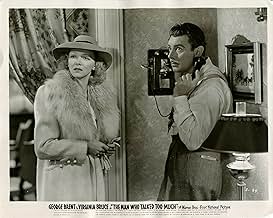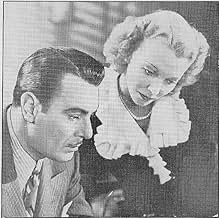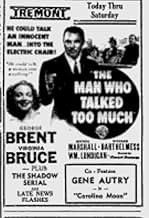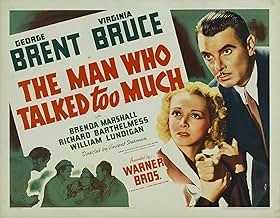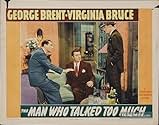NOTE IMDb
6,3/10
425
MA NOTE
Ajouter une intrigue dans votre langueA DA quits after wrongly convicting an innocent man. His secretary joins his new law firm, which prospers through mob ties. His brother John joins but discovers corruption and helps the feds... Tout lireA DA quits after wrongly convicting an innocent man. His secretary joins his new law firm, which prospers through mob ties. His brother John joins but discovers corruption and helps the feds, leading to his own false murder conviction.A DA quits after wrongly convicting an innocent man. His secretary joins his new law firm, which prospers through mob ties. His brother John joins but discovers corruption and helps the feds, leading to his own false murder conviction.
- Réalisation
- Scénario
- Casting principal
Edwin Stanley
- District Attorney Nelson
- (as Ed Stanley)
Kay Sutton
- Mrs. Knight
- (scènes coupées)
Avis à la une
The Man Who Talked Too Much presumably refers to George Brent, who plays a district attorney who sends an innocent man to the death house. To compensate for his mistake he becomes a struggling defense lawyer, eventually taking on some nasty gangland types in order to make ends meet. The film starts in terrific fashion and is well acted and written throughout, but it eventually bogs down into a standard 'B' plot of frame-ups and revenge. Nevertheless I recommend this to anyone interested in second features, and it certainly has the grit one expects of Warner crime films. Watch for Marc Lawrence in one of his patented bad guy roles.
Brilliant ADA Stephen M. Forbes (George Brent) gets an innocent man executed. In frustration, he quits to work for the innocent. Only it doesn't pay well. That when gangster Roscoe recruits Steve to be a mob lawyer. He uses the money to put his younger brother Johnny through law school.
I saw the punch coming a mile away and the KO really bugged me. I can take a bit of artistic license, but I can't take that. The stunts are too outrageous. This is based on a play and is the second adaptation. While I can accept the premise as written, it feels constructed. Mostly, I don't like Steve turning into a mob lawyer that quick. Maybe he could defend Roscoe first without agreeing to defend all his friends. This deals with a real lawyer issue, but does it in a rather ham-fisted way. This is borderline fine.
I saw the punch coming a mile away and the KO really bugged me. I can take a bit of artistic license, but I can't take that. The stunts are too outrageous. This is based on a play and is the second adaptation. While I can accept the premise as written, it feels constructed. Mostly, I don't like Steve turning into a mob lawyer that quick. Maybe he could defend Roscoe first without agreeing to defend all his friends. This deals with a real lawyer issue, but does it in a rather ham-fisted way. This is borderline fine.
The Man Who Talked Too Much is the second of three versions that Warner Brothers did of the same film. I've not seen The Mouthpiecewhich was the prototype, but the film Illegal which starred Edward G. Robinson that came out in 1955 was far superior to this one. Possibly audiences were more sophisticated then and wouldn't buy what was being sold in this film.
George Brent plays our protagonist and he's a hard driving Assistant District Attorney who mistakenly convicts an innocent man and the real culprit does not confess until it is too late. Feeling a lot of remorse he leaves the DA's office and goes into private practice with faithful secretary Virginia Bruce. But he's not getting any good paying clients until he gets off Henry Armetta for assaulting one of Richard Barthelmess's hoods. Impressed with his work Barthelmess puts Brent on permanent retainer.
With that a change comes over Brent that his idealistic younger brother William Lundigan doesn't like. After that Lundigan who is a newly minted attorney himself does something that in real life would get him disbarred.
What it is I won't reveal, but instead of disbarment he gets framed for murder and it's up to Brent to save him by whatever means necessary.
What Lundigan does in fact is what turned me off to this film which is a sincere effort by the cast and director. Lundigan's legal dilemma as shown in the film has been dealt with before on the big screen and small. In fact Tom Cruise in The Firm had the same situation and he handled much better than Lundigan.
Check Robinson's film also it's far better done.
George Brent plays our protagonist and he's a hard driving Assistant District Attorney who mistakenly convicts an innocent man and the real culprit does not confess until it is too late. Feeling a lot of remorse he leaves the DA's office and goes into private practice with faithful secretary Virginia Bruce. But he's not getting any good paying clients until he gets off Henry Armetta for assaulting one of Richard Barthelmess's hoods. Impressed with his work Barthelmess puts Brent on permanent retainer.
With that a change comes over Brent that his idealistic younger brother William Lundigan doesn't like. After that Lundigan who is a newly minted attorney himself does something that in real life would get him disbarred.
What it is I won't reveal, but instead of disbarment he gets framed for murder and it's up to Brent to save him by whatever means necessary.
What Lundigan does in fact is what turned me off to this film which is a sincere effort by the cast and director. Lundigan's legal dilemma as shown in the film has been dealt with before on the big screen and small. In fact Tom Cruise in The Firm had the same situation and he handled much better than Lundigan.
Check Robinson's film also it's far better done.
As much as Americans express pride in their political and legal system, it is also true that they hold politicians and attorneys in very low esteem. The popular perception of lawyers as unethical and devious is not new and here it permeates this modest 1940 feature. What George Brent does on the screen has little connection to reality (there is one particularly silly scene in which he grandstands by ingesting poison during a murder trial), but sets the stage for his reformation and a happy ending.
The movie flies by so it may be worth 76 minutes of a viewer's time as a reminder of Hollywood's long-standing tradition of disparaging the legal profession.
The movie flies by so it may be worth 76 minutes of a viewer's time as a reminder of Hollywood's long-standing tradition of disparaging the legal profession.
A man whom Assistant District Attorney George Brent convicted for murder dies in the electric chair. Then Brent discovers he was innocent. So he goes into private practice; it's better that a hundred guilty men go free than an innocent man go to jail. But his clients can't pay their bills. Then along comes gangster Richard Barthelmess, and he pays his bills. But when Brent's brother, William Lundigan, is sentenced to die for a murder one of Barthelmess' hoods committed, can Brent do anything?
It's a remake of 1932's THE MOUTHPIECE, and like many of Brian Foy's B productions, moves along at a good clip. Brent is good in the part, solid if a tad stolid, and backed by a cast that includes Virginia Bruce, Brenda Marshall, George Tobias, and John Litel. But that competent speed never quite reaches the point of panic, and the movie seems lightweight as a result.
It's a remake of 1932's THE MOUTHPIECE, and like many of Brian Foy's B productions, moves along at a good clip. Brent is good in the part, solid if a tad stolid, and backed by a cast that includes Virginia Bruce, Brenda Marshall, George Tobias, and John Litel. But that competent speed never quite reaches the point of panic, and the movie seems lightweight as a result.
Le saviez-vous
- AnecdotesFrank J. Collins based his protagonist on Manhattan defense attorney William Joseph Fallon, dubbed "The Great Mouthpiece" by the 1920's New York press, who had a short but spectacularly successful career before succumbing to the effects of his own dissoluteness at the age of 41.
He has been cited as one of the inspirations for the celebrity lawyer Billy Flynn in the popular musical Chicago. He is also portrayed for six episodes by David Aaron Baker in the HBO television series Boardwalk Empire (2010).
- ConnexionsReferences Vingt mille ans sous les verrous (1932)
Meilleurs choix
Connectez-vous pour évaluer et suivre la liste de favoris afin de recevoir des recommandations personnalisées
Détails
- Date de sortie
- Pays d’origine
- Langue
- Aussi connu sous le nom de
- El que habló demasiado
- Lieux de tournage
- Société de production
- Voir plus de crédits d'entreprise sur IMDbPro
- Durée1 heure 16 minutes
- Couleur
- Rapport de forme
- 1.37 : 1
Contribuer à cette page
Suggérer une modification ou ajouter du contenu manquant



